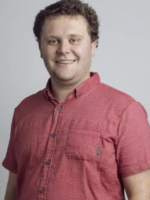A community nonprofit that’s rehabilitating blighted sites in Springfield is working with faculty and students from Wittenberg University to test for lead levels in the soil. The Conscious Connect redevelops rundown and vacant lots across southwest Ohio to create pocket parks.
The non-profit was launched in 2015 by Wittenberg University graduates Karlos L. Marshall and Moses B. Mbeseha. Their primary objective is to eradicate book deserts. Originally, Marshall and Mbeseha set up literacy stations at barber shops, beauty salons and other small businesses to try to get books into the hands of children who lived in the community. The founding initiative was called "The Root."
The pocket parks initiative takes the organization's mission a step further. On the redeveloped lots, they build free outdoor libraries with culturally relevant books. Kids can take the books home or read them right there in the pocket park. Around the libraries, there are benches, bike racks, disc golf baskets, and basketball courts.
The non-profit would like to have community gardens that grow food on the lots someday. But many of the redeveloped lots either used to have, or are next to, homes with lead paint. Adam Brown is a Wittenberg alumnus and the board treasurer at The Conscious Connect. He also runs a clinical consulting firm. He said testing for lead at the Children's Equity Zones was all about assurance.
“Since kids interact with these spaces a lot, we wanted to make sure that we understand what spaces are safe if they dig in the dirt or something," he said. "Also, in terms of gardens, if we ever get to that point, we want to make sure that we’re not creating a harmful situation for the community.”
Dr. Sarah Fortner, formerly of Wittenberg University and now with the Science Education Resource Center at Carleton College, tested the soil for lead in the fall with her Research Methods class. .
Brown says the results showed that there were high levels of lead in the soil at some of the locations tested—including levels that exceed safe gardening limits. He says the results of the testing will help inform the non-profit as they decide how to transform the spaces in the future.
Environmental reporter Chris Welter is a corps member with Report for America, a national service program that places journalists into local newsrooms.
Copyright 2021 WYSO. To see more, visit WYSO. 9(MDA5NTM4MTIyMDE0MTg3NDc2MTVlZjdmNQ001))

